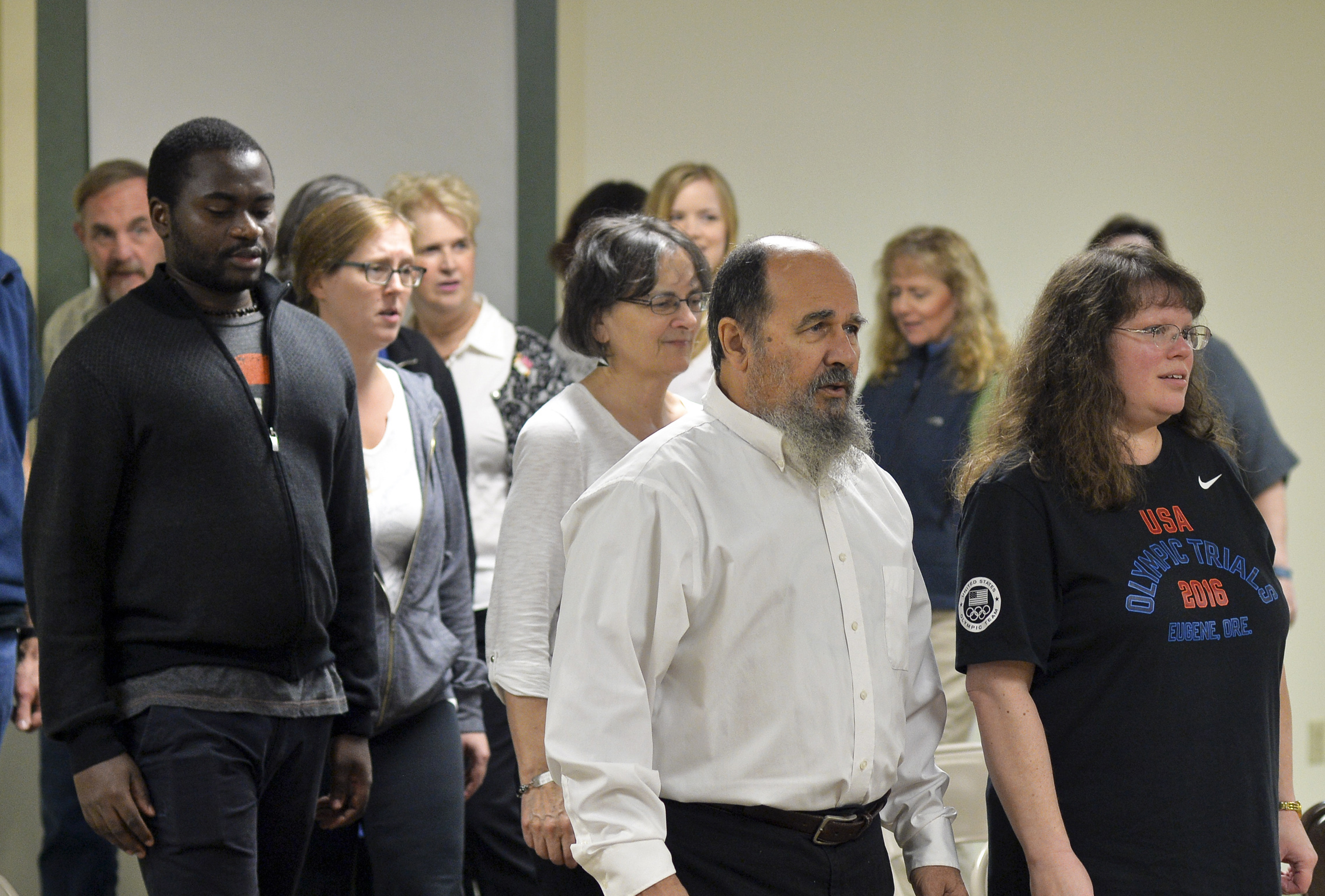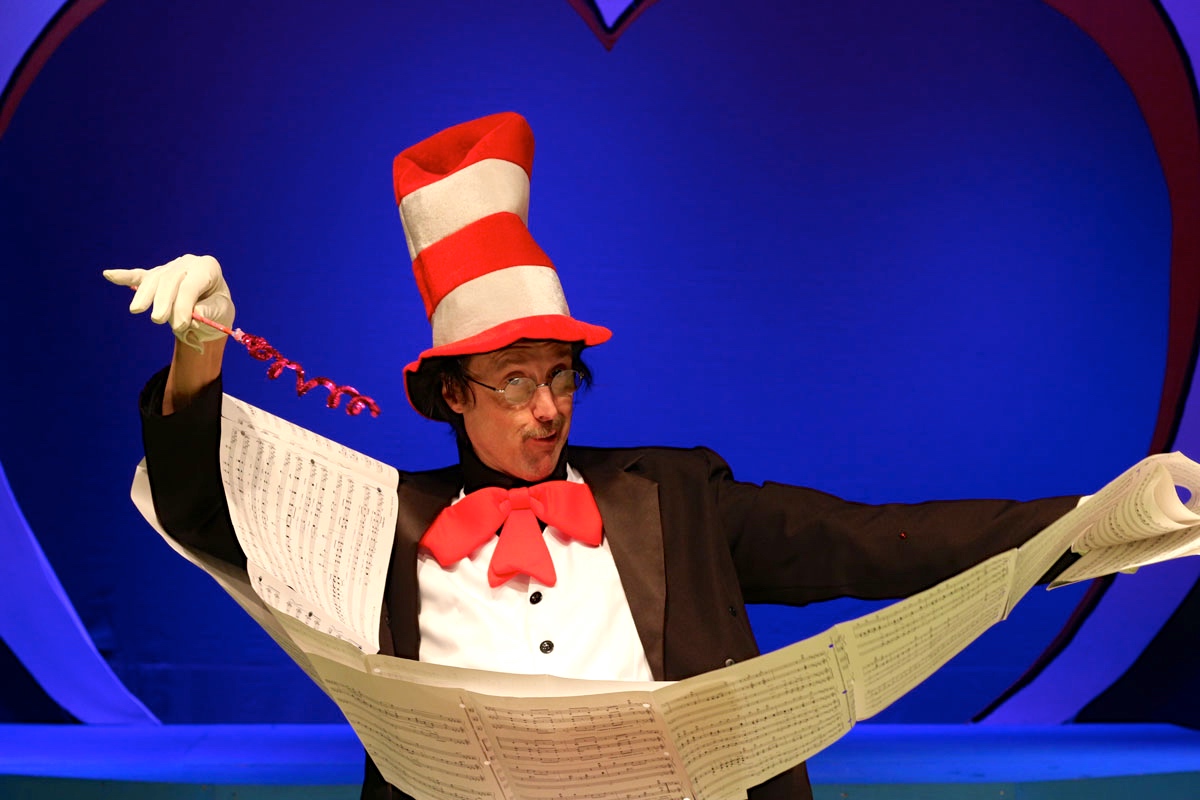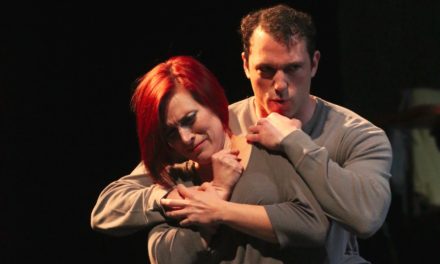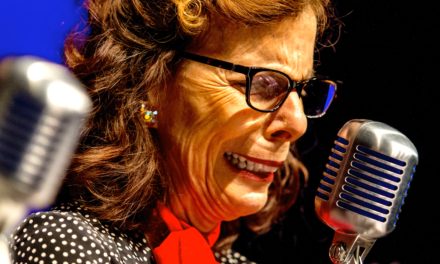
Members of the chorus rehearse for the Eugene Opera’s production of “Béatrice and Bénédict,” which will be onstage Oct. 28 and 30 at the Soreng Theater.
(Photo by Paul Carter)

By Randi Bjornstad
The Eugene Opera tried something new and a bit daring last year, expanding the season from its usual two “grand opera” productions to include two additional, more spartan “chamber operas.”
The experiment was so successful that it’s being done again for the company’s 40th season, which opens Oct. 28 and 30.
The first show, which falls in the chamber opera category, is what the company is calling “Much Ado About Nothing,” aka “Béatrice and Bénédict,” composer Hector Berlioz’ operatic version of William Shakespeare’s comedy, “Much Ado About Nothing.”
The chamber operas go onstage in the 500-seat Soreng Theater in the Hult Center for the Performing Arts, with less lavish costuming, the barest suggestion of sets and a smaller orchestra.
Besides saving the company money, the arrangement offers a more intimate, less intimidating atmosphere for newer operagoers while still satisfying the yen of longtime aficionados for the music and the voices.
The grand operas will continue to appear in the Silva Concert Hall, which has a capacity of nearly 2,500 seats.

Mark Beudert, general director of Eugene Opera, on the stage of the Silva Concert Hall, introduced the audience to a recent season of the company. Beudert has been the opera’s general director since 2006 and continues his own performing career. (Photo by Paul Carter)
Mark Beudert, the general director of Eugene Opera, is perennially enthusiastic about the company, but if anything his delight about the coming season seems ratcheted up yet another notch.
Now beginning his 11th year with the organization, Beudert believes Eugene Opera has found its groove.
“I knew when we did Puccini’s ‘Girl of the Golden West’ (in 2014) that we had made a leap to the next level,” Beudert said. “At that moment, all the work we had done to that point suddenly came to fruition in unexpected ways.”
Partly it was the influence of conductor Andrew Bisantz, who during the past five seasons has forged a relationship with the opera orchestra that has elevated the music to a higher level of both confidence and joy, Beudert said.
“We also had taken on a couple of really daring projects the previous two seasons — ‘Nixon in China’ and ‘Dead Man Walking’ — so when we came back to the Puccini, the orchestra seemed to feel its maturation in a very powerful way.”
When something like that happens, Beudert said, “You need to just be ready to step up and ride that wave.”
Musical changes
Beudert personally is riding that wave in a new direction.
During the 10 years the professional tenor has been director of Eugene Opera, he also has been professor of opera at Notre Dame University, spending his time shuttling back and forth from teaching in Indiana to shepherding productions in Eugene.
However, in recent years Notre Dame, a university affiliated with the Roman Catholic Church, increasingly has committed its academic and financial support to its sacred music program.
At the same time, Beudert has become more committed to opera in Eugene and now is in the process of phasing out his relationship with Notre Dame.
“Through this process, I’ve come to realize that directing Eugene Opera now is really a full-time job, and I really want to be able to commit my time and attention to growing and developing it,” he said.
For the foreseeable future, Beudert will continue to travel back and forth to Indiana, where his wife, Jennifer Knapp, is manager of the Robinson County Learning Center, a community outreach program of Notre Dame University.
“Where in the past I have spent two weeks in Eugene preparing for each opera performance, I now will be spending at least three,” Beudert said. “Eugene Opera has come a long way, and I want it to become a truly great company — I totally believe it is possible.”
Opera for all
Incorporating the chamber operas into Eugene Opera’s season is part of Beudert’s goal to “provide opera for civilians,” which he unabashedly admits is “a concept straight out of Leonard Bernstein.”
“Bernstein presented and explained music in a way that was both sophisticated and understandable,” Beudert said. “He was very successful at showing people that music is not rocket science, and everyone can understand and enjoy it.”
Another advantage of the chamber operas is the opportunity to feature up-and-coming opera performers from the Pacific Northwest as well as stars from major opera companies throughout the nation, Beudert said.
“Eugene Opera is really an anomaly among operas,” he said. “We’re a a full-fledged company supported by an area of about 350,000 people, and we’re two hours south of the next major pool of singers, so we can maintain elements of community theater and also attract major talent from other places.”
“Béatrice and Bénédict” is a case in point. Mezzo-soprano Melina Pyron will sing Béatrice opposite tenor Brendan Tuohy’s Bénédict. Coloratura soprano Emily Way is Héro, baritone Zachary Angus is Claudio, with Bill Hulings as Don Pedro, baritone Sandy Naishtat as Somarone, mezzo-soprano Laura Beckel Thoreson as Ursule and Steve Wehmeier as Léonato.
Pyron, Tuohy, Way, Angus and Beckel Thoreson have résumés that include national or international performances. Hulings and Naishtat are performers based in Eugene.
The French composer Berlioz had wanted to write an opera based on the Shakespearean comedy ever since his return to France late in 1832 at age 30 from a two-year sojourn in Italy that he was required to do as a winner of the “Prix de Rome” award.
But other commissions, projects and life events intervened, and he didn’t finish the project until 1862, seven years before his death, when it was first performed in Baden-Baden, Germany, at the Theater der Stadt.
Berlioz’ “Béatrice and Bénédict” is generally considered the first opera of stature based on a Shakespeare play, although other renowned composers also later created their own, especially Giuseppe Verdi’s “Falstaff,” “Otello” and “Macbeth,” Benjamin Britten’s “A Midsummer Night’s Dream” and recently Thomas Adès “The Tempest.”
The plot of “Béatrice and Bénédict,” as with many operas — and movies, plays, books, popular music and real life, for that matter — centers on love sought, lost and won.
It’s set in 16th-century Italy, after a military victory that sees victorious soldiers returning from the front.
A young woman named Héro awaits her fiancé, Claudio, accompanied by her cousin Béatrice. Claudio shows up with a friend, Bénédict, who has never gotten along well with Béatrice, and the two trade their usual gibes and insults.
Bénédict has sworn to friends that he will never marry, but when his friends play a trick on him, telling him that Béatrice is secretly in love with him, he takes it as a matter of honor not to let her love go unrequited and decides to court her.
Béatrice’s friends play a similar trick, telling her that Bénédict is in love with her.
Claudio and Héro’s upcoming wedding is celebrated with a masquerade ball, where Béatrice realizes she really does love Bénédict. When Héro and Claudio are married, Bénédict impulsively proposes to Béatrice, and they, too, tie the knot.
But given their past habits, a smooth marriage is not guaranteed. The opera ends with the lines, “Today a truce is signed; we’ll be enemies again tomorrow.”
The rest of the season
After “Béatrice and Bénédict,” the Eugene Opera’s next production will be on New Year’s Eve and Jan. 2, with “Opera Trio,” featuring Act 1 Scene 1 of Giuseppe Verdi’s “Aida,” Act 3 of Francis Poulenc’s “Dialogues of the Carmelites” and Act 2 of “Die Fledermaus” by Johann Strauss.
On March 10 and 12, Eugene Opera and Eugene Ballet will collaborate in performance of Leonard Bernstein’s masterpiece, “West Side Story.”
The season will close on May 5 and 7 with a chamber-opera version by Peter Brook of Georges Bizet’s “La Tragédie de Carmen.”
Eugene Opera
Béatrice and Bénédict
When: 7:30 p.m. Friday, Oct. 28 and 2:30 p.m. Sunday, Oct. 30
Where: Soreng Theater, Hult Center for the Performing Arts, Willamette Street and Seventh Avenue in downtown Eugene
Tickets: $34 to $54; Hult Center box office or Eugene Opera, 541-682-5000
Information: 541-485-3985 or info@eugeneopera.com













A pleasure to read such complete coverage of a creative and exciting opera season. Thank you.